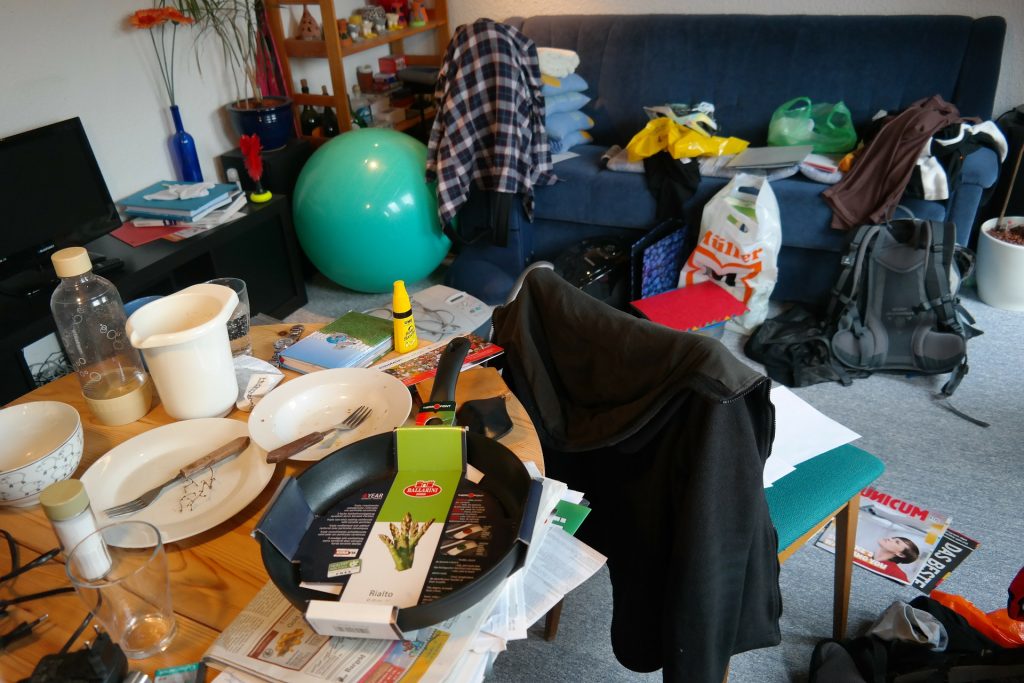This article was written by Professor Frank Trentmann from Birkbeck’s Department of History, Classics and Archaeology. It was originally published on The Guardian
 Is this the year we finally get to grips with all our stuff? If so, it has been a long time coming. Forecasters and commentators say we have entered a new era where people prefer to share rather than own, and prize experiences over possessions. Retailers worry about the implications for them of a public sated on “peak stuff”. Official figures suggest that Britons are consuming ever fewer resources. And witness the worldwide success of the rationalisation bible, Marie Kondo’s The Life-Changing Magic of Tidying Up: The Japanese Art of Decluttering and Organising.
Is this the year we finally get to grips with all our stuff? If so, it has been a long time coming. Forecasters and commentators say we have entered a new era where people prefer to share rather than own, and prize experiences over possessions. Retailers worry about the implications for them of a public sated on “peak stuff”. Official figures suggest that Britons are consuming ever fewer resources. And witness the worldwide success of the rationalisation bible, Marie Kondo’s The Life-Changing Magic of Tidying Up: The Japanese Art of Decluttering and Organising.
It’s an encouraging thesis with which to start a new year. If only it were true. The talk is of the sharing economy, but the reality is that very little is being done on a large-scale level to reduce our high-consumption lifestyles. While it might feel virtuous to Marie Kondo your wardrobe, we urgently need to address the vast amount of often unseen resources that support our modern way of life.
To be fair, there are some signs of hope. The first repair café opened in Amsterdam in 2009. Since then, a thousand of these places have sprung up across Europe and North America, giving people a chance to share tools, materials and knowledge.
The bulk of the so-called sharing economy, however, follows a different model. On New Year’s Eve more than half a million people on the planet stayed in a home rented via Airbnb. Much of this is not about sharing but about renting and profit. It increases the demand for resources, rather than reducing it. Hotels earn less, but hosts earn more – which they spend on additional holidays. Lodgers save on cheaper accommodation and take more mini-breaks to Florence and Barcelona. Meanwhile, the total number of people owning second homes (and a second set of domestic appliances) steadily rises.
Car clubs have become a common sight. But let’s put it in perspective. In the UK, Zipcar has 1,500 cars. At the same time, Britons bought more than 2.7m new cars last year, more than ever before. Yes, perhaps, young people are less car-oriented today, but it might also just be a lag – housing costs and university fees have gone up and mean that cars are bought at 30, not at 20.
Sharing is not some new paradigm. Modern societies have done it for a long time – from the cooperatives to municipal baths and playgrounds. While growing in some commercial sectors, we are seeing it being chopped down in others, such as public libraries.
The story of “from stuff to fluff” is a similar mix of hopeful thinking and bad history. Visits to film and music festivals have sky-rocketed in the last decade. But let’s remember that more than 12,000 people flocked to the rehearsal of Handel’s Fireworks in 1749 in Vauxhall Gardens, causing a three-hour-long traffic jam on London Bridge. Experiences have been an essential ingredient in the rise of consumption over the last 500 years, from pleasure gardens to football stadiums. Nor is it wise to think of possessions and experiences as separate: since the 17th century, shopping for pleasure has been about making purchase a sensation.
Commentators have been complaining of people accumulating too many possessions since the sumptuary laws of the 15th and 16th centuries. In ancient Rome, Seneca warned the young were being corrupted by the pursuit of things and leisure, and before him so did Plato.
Today, services make up a bigger share of the world economy than ever – more than 40% in value-added terms, compared with 30% in 2008. But this does not mean the volume of goods and merchandise has fallen. It has grown in total, just a bit less fast than services. Since 1998, merchandise trade has more than doubled. More than four times as many containers travelled back and forth between Europe and Asia in 2013 as in 1995.
And a lot of leisure and other “experiential” services depend on material and resources. Zip-wiring in a jungle might feel more virtuous than buying a designer handbag, but you do not get there by teletransportation. In 2007, the French travelled 42bn kilometres to pursue their hobbies and another 12bn to eat out. That takes a lot of fuel.

A hybrid Toyota Prius might save petrol, but it eats up valuable rare-earth elements.
Our love of digital services often leads to the idea that these somehow must be ethereal. But behind virtual communication there lurks a lot of physical matter: power stations, data centres, cables, batteries and cooling systems. Our mobile phones and headphones would not work without lanthanides. A hybrid Toyota Prius might save petrol but it also needs 9kg (20lb) of rare-earth elements, and that’s just for its battery. Information and communications technology already account for 15% of the service sector’s electricity consumption in France.
Adam Smith, the great moral philosopher and economist, noted in his 1759 Theory of Moral Sentiments that people spent more and more on “trinkets” and “little conveniences” and then designed new pockets in order to carry a greater number. Today, you can buy magic jackets with a dozen, even 20 pockets, to accommodate a tablet, phone and other digital devices.
We are not dealing here with a peculiarly Anglo-Saxon phenomenon. Contrary to popular image, Scandinavians are not that austere either. In Stockholm, for example, the number of electronic appliances tripled between 1995 and 2014.
The idea of peak stuff rests in part on distorted and inadequate numbers. At the Office of National Statistics’ latest count (2016), the average Briton consumed 10 tonnes of raw materials and products in 2013, down from 15 tonnes in 2001. That looks heart-warming, but is a bit of an optical illusion. For it only counts the materials used in the UK. We are considered to have used more fossil fuel and minerals if we make a car in Luton with British coal and iron and steel than if we import a car made in Brazil or Poland. We really need to know about all the materials used. In effect, since the 1980s, Britain has off-shored the environmental consequences of its own consumption.
What’s needed is a level of thinking and a scale of action commensurate to the problem. By all means, buy fewer gifts next Christmas, but don’t fool yourself that this will accomplish much. Shopping is part of it, but our entire lifestyle is using up resources at unsustainable levels. Consumers carry a big, heavy “ecological rucksack” on their shoulders full of all the materials needed to service their lifestyle. It amounts to between 45 and 85 tonnes a year per person, depending on where you are in the rich world. This includes leisure, travel and comfy homes with central heating.
Changing that lifestyle must be the fundamental focus. This is not impossible; modern history is one rich story of successive lifestyle changes. But these have rarely been the result of individual choices. States and social movements played critical roles, harnessing the power and moral authority of collective opinion. If we are to bridge the gap between aspiration and achievement, this must be their task again.
Further information:





 I
I
 As a researcher of the use of sport events and stadiums in regeneration projects I was interested in a recent graphical representation of how special events are linked to UK Gross Domestic Product (GDP) put out by the Office for National statistics (ONS). The representation showed a sharp spike in GDP at the time of the London 2012 Olympics and Paralympics.
As a researcher of the use of sport events and stadiums in regeneration projects I was interested in a recent graphical representation of how special events are linked to UK Gross Domestic Product (GDP) put out by the Office for National statistics (ONS). The representation showed a sharp spike in GDP at the time of the London 2012 Olympics and Paralympics.
 On 1 April, 2016
On 1 April, 2016  Scottish independence is a low probability event, but low probability events like the break-up of the Soviet Union or of Czechoslovakia do happen, so it is sensible to do some contingency planning. The Scottish Affairs Committee of the House of Commons has been examining the defence policy for an independent Scotland as part of its enquiry into The Referendum on Separation for Scotland. Together with Professor Malcolm Chalmers of the Royal United Services Institute I gave evidence to the Committee on January 23.
Scottish independence is a low probability event, but low probability events like the break-up of the Soviet Union or of Czechoslovakia do happen, so it is sensible to do some contingency planning. The Scottish Affairs Committee of the House of Commons has been examining the defence policy for an independent Scotland as part of its enquiry into The Referendum on Separation for Scotland. Together with Professor Malcolm Chalmers of the Royal United Services Institute I gave evidence to the Committee on January 23.